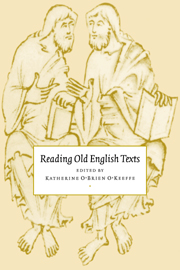Book contents
- Frontmatter
- Contents
- List of contributors
- List of abbreviations
- Note on the text
- Introduction
- 1 The comparative approach
- 2 Source study
- 3 Language matters
- 4 Historicist approaches
- 5 Oral tradition
- 6 The recovery of texts
- 7 At a crossroads: Old English and feminist criticism
- 8 Post-structuralist theories: the subject and the text
- 9 Old English and computing: a guided tour
- Suggestions for further reading
- Index
4 - Historicist approaches
Published online by Cambridge University Press: 18 December 2009
- Frontmatter
- Contents
- List of contributors
- List of abbreviations
- Note on the text
- Introduction
- 1 The comparative approach
- 2 Source study
- 3 Language matters
- 4 Historicist approaches
- 5 Oral tradition
- 6 The recovery of texts
- 7 At a crossroads: Old English and feminist criticism
- 8 Post-structuralist theories: the subject and the text
- 9 Old English and computing: a guided tour
- Suggestions for further reading
- Index
Summary
Of course it is a truism, of which much has been made, that we cannot see the past. But we can work hard and faithfully to portray it, to understand and explain it.
Iris MurdochIt was deism that first taught us to accept the pain of historicity.
Irving HoweAs they interpret the remains of a past culture, all works on Old English language and literature are historical in method and intent. Even an austerely self-contained philological study has its place in this reconstruction because it helps us to decipher the textual culture that the Anglo-Saxons produced in their own time and place. Crafting an elegant taxonomy for the functions of Old English verbs and untangling the manuscript confusions that explain otherwise mystifying synonymies between Latin and Old English words in glossaries are forms of intellectual pleasure. But each also provides us with some entry into Anglo-Saxon England through the most compelling mass of evidence that survives from that culture, namely, its language. To cite only classic works, Bruce Mitchell's Old English Syntax (1985) or Herbert Dean Meritt's Fact and Lore about Old English Words (1954) and Some of the Hardest Glosses in Old English (1968) go a long way toward illuminating the intellectual practices of the Anglo-Saxons by studying their language.
Indeed, the claims of philology on historicism become most palpable when one recollects that modern scholars define the Anglo-Saxons, if only as a premise for argument, to be those people who lived in England from perhaps 600 CE onwards and who spoke or (less often) wrote a Germanic language known conventionally as Old English.
- Type
- Chapter
- Information
- Reading Old English Texts , pp. 79 - 100Publisher: Cambridge University PressPrint publication year: 1997
- 4
- Cited by

